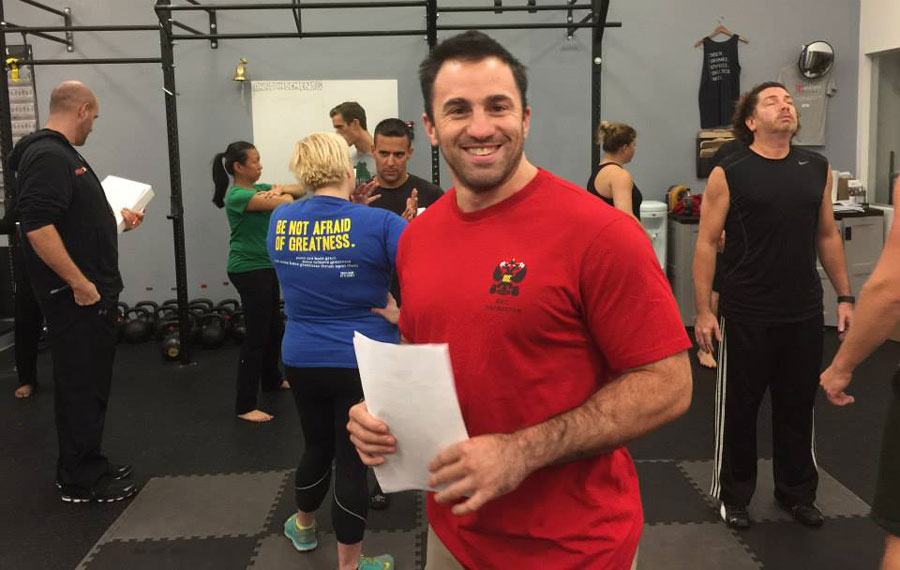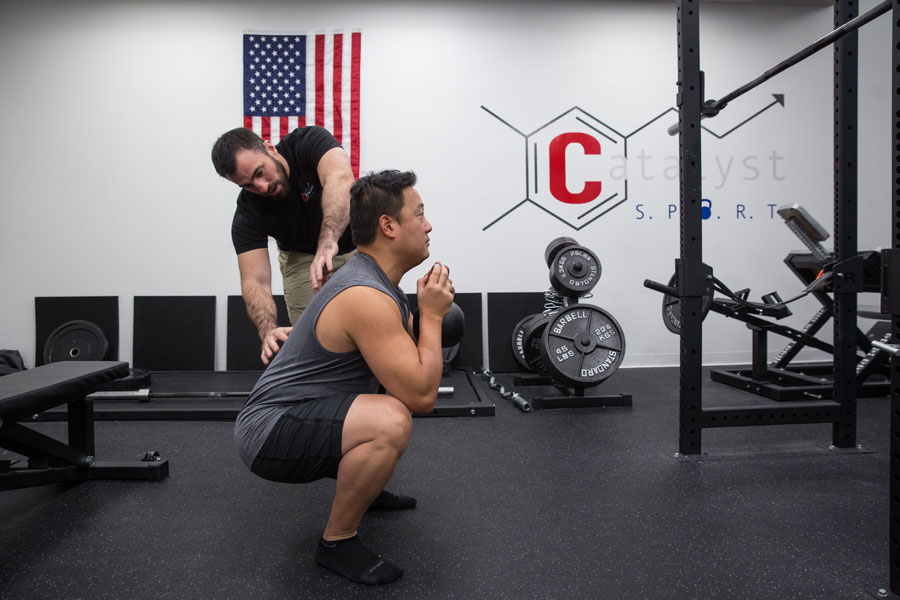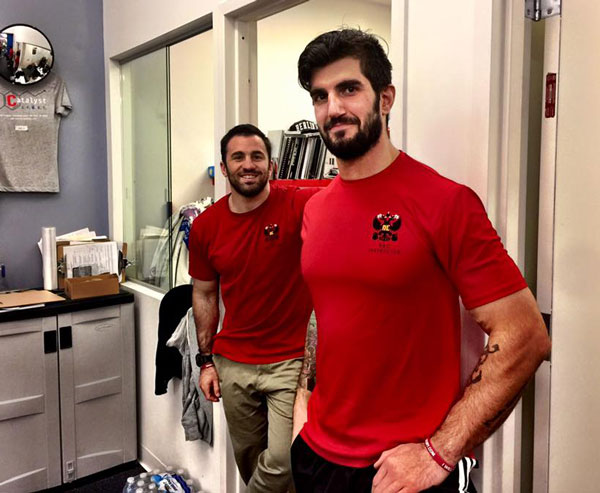How to Become a Highly Effective Coach, Interview with Jason Kapnick, RKC Team Leader
By Adrienne Harvey, SrPCC, RKC-TL, CK-FMS

Dragon Door: It’s great to speak with you again. When we first
interviewed you in 2013, I think you had just earned your RKC certification and completed the Beast Tamer Challenge...
Jason Kapnick: That's correct, it was six years ago, almost to the day! I still get comments about that interview, since it always comes up when people Google me. That first
RKC weekend was really huge for me and my professional development—especially with the publicity from the Beast Tamer Challenge. More importantly, the workshop experience took me to the next level professionally, which says a lot about the RKC Community.
The certification is not just about the six movements, it's about how to coach them. And even more importantly, we learn how to use a principle-based method of coaching. We learn how to coach our clients to use tension, maintain a neutral spine, and many other concepts. In addition to tests on our own technique, we're also tested on how we coach someone—usually a member of the general public who volunteered for a free kettlebell lesson. There's a huge emphasis, especially in the more recent years on developing really competent, super high-level coaches. That's something I certainly got from the RKC.
In 2011, I made a career switch from investment banking to fitness. I wanted to start a business within the fitness industry. I started at the bottom as a personal trainer because I wanted to get that "boots on the ground" experience. The RKC was a real watershed in my new career. I had just gotten started, but was pretty knowledgeable about fitness. While I had been doing well working with my clients, over the months that followed the RKC I really vaulted into a
higher level of professionalism. I became a much more effective coach when interacting with my clients as well as with their cueing and programming. Obviously, that translated into better results for the clients as well.
The RKC weekend changed the whole trajectory of my career. And now as an
RKC Team Leader, I'm super excited to help other people, their careers as instructors, trainers, or coaches. The extra skills and knowledge from the RKC helps your clients get better results—which brings in more clients, higher paying clients and greater client retention. I’m super excited to help others in the same way that the RKC helped me with my own career.
Dragon Door: What does the RKC mean to you, and what’s inspired you to stay involved with the Dragon Door brand?
Jason Kapnick: The RKC is such a great community of people. They’re without ego and help each other. Those of us who are RKC instructors know what kettlebells had done for our own personal fitness—and so many people have healed injuries with
kettlebells. When we get together for workshops, it's all about helping each other become better coaches. Every time I go to an RKC workshop I get energized. I always learn more about coaching, fitness programming, and ways to deliver more quality to my clients. After a workshop, I can't wait to work on my business and deliver those results for our clients. That’s what it's all about!

Dragon Door: What have been some of the biggest changes you’ve seen with your training and your business since that first interview we had in 2013? You earned your RKC and conquered the Beast Tamer Challenge… what happened next?
Jason Kapnick: One things the RKC really conveyed to me was the importance of
mastering the basics. For example, it’s important to master the kettlebell deadlift before moving on to the kettlebell swing. So, I've changed the way I approached teaching the basics for both myself and my clients. We spend more time
building the foundation before moving to the next level. I think my clients appreciate that. It helped me simplify my approach, and I think the clients have appreciated it.
The RKC gave me the ability to coach, cue, and use more drill-based corrections that people can feel instead can feel rather than using cognitive explanation. Now we practice a kettlebell deadlift for a couple of weeks or until it looks solid, then we move on to begin teaching the kettlebell swing. The clients are picking up each new concept much more quickly, and our teaching is more dynamic.
For example, if someone's not locking out their swing all the way, instead of just trying to explain it to them, I can teach them the static stomp deadlift or Hardstyle plank from the RKC manual. Instead of having to understand it, now the client can feel the difference which is so much more powerful.
Hardstyle kettlebell training shortens the learning curve and the clients get so much more from their workouts. The RKC taught me how to use more movement-based corrections instead of verbal explanation.
The RKC has also helped me create more intelligent programming for our general population clients. My background was in high level athletics and
strength and conditioning, but the programming lectures helped me create programs that can benefit everyone.
Dragon Door: We were talking a little bit before the call about the
RKC, the
HKC—basically the Hardstyle kettlebell training that we teach at Dragon Door. Why have you chosen to practice and teach Hardstyle kettlebell training?
Jason Kapnick: The Hardstyle methods are great extensions of my fitness philosophy and our fitness philosophy at Catalyst. We start with a foundation of movement quality which involves flexibility to an extent, but also includes coordination, motor control, and stability. We also work to preserve movement quality to prevent or reduce the chance of injury in the future. Strength and conditioning built on a foundation of movement quality leads to the highest level of performance.
The Hardstyle system is so powerful because it teaches us how to manage tension. There’s a big focus on intra-abdominal pressure, too. Stuart McGill, the god of spine mechanics, also taught how intra-abdominal pressure can prevent and heal back injury. That's just one example how we use principles of authentic human movement from a clinical setting in a fitness setting. Safety and performance are not at odds in the Hardstyle method, which really attracted me to it. It’s also why we've had such great results with our clients using Hardstyle methods.
Dragon Door: What inspired you and your co-founders to open Catalyst SPORT?
Jason Kapnick: We opened our doors in the summer of 2014. My business partners are both
RKC-IIs, Joe Boffi and Dr. Kathy Dooley. I think the RKC helped me become a better personal trainer which allowed us to build the client base necessary for opening our own facility.

Beyond that, the principles of Hardstyle have allowed us to build a really powerful fitness product. Our flagship offering is semi-private training which is three students per instructor and everyone has their own completely customized program. We start with a thorough one-on-one evaluation. We use the Hardstyle principles in every single session.
In a semiprivate setting, mastery of the basics becomes even more important. The client has a sense of empowerment when they know we’re going to coach them, write the program and provide all the tools for them to be successful. We named our facility Catalyst because we want it to be a catalyst to change the lives of our clients by changing the way they move and improving their fitness. By imparting these principles, we empower our clients to use them for the rest of their lives.
Dragon Door: One last thing, you're hosting an almost already sold out RKC in October. What's inspired you to host so many HKCs, RKCs, and RKC-II workshops at Catalyst over the past few years?
Jason Kapnick: Yes, we have RKC Workshops with
Coach Fury coming up in
October and
November which are filling up fast. We've been just blown away by the quality of the workshops that Dragon Door puts together. There's such an emphasis on building competent instructors who care about safety, about their clients, and of course about getting results. This will be either the fourth or fifth
Dragon Door workshop we’ve hosted so far!
I think it's just such a fantastic product, and the instructor candidates have an amazing experience. They leave as better trainers, and we keep in touch with a lot of them. They even come to our facility from time to time to get a tune-up!
At the beginning of this interview we talked a lot about what the RKC has done for my career, and I think it’s done a lot of the same for many of the people that we’ve worked with. They’re more confident, competent personal trainers who became more successful in their business because of the skills they’ve learned at the RKC. I love having a career where I can see that the tangible output of my work—even on a weekly basis—is helping people.
The RKC is a big part of that process because we're not just helping end users, we're also helping instructors do a better job. We have a whole community of people who are going out and helping even more people. To me, that's what it's all about: helping people and making the world of fitness a better place.
Back